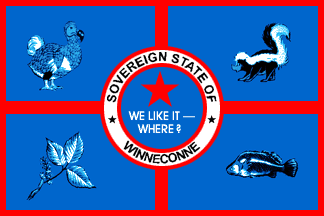Winneconne Day

On July 4th, the United States celebrates Independence Day, marking the nation’s declaration of independence from the United Kingdom back in 1776. And that’s also celebrated in the small Wisconsin town of Winneconne. But Winneconnians (Winneconnites?) also have a second independence day, one they celebrate about two and a half weeks after the big one. Today, July 21st, is Winneconne Day — all because of a fun overreaction to a typographical omission.
Winneconne is located in the eastern part of Wisconsin, on an inlet connecting Lake Winneconne to Lake Butte des Mortes. (Here’s a map.) It is home to about 2,500 people and was originally founded on the site of bloody battle between French colonists and Native Americans; “Winneconne” is a Native American word meaning “place of skulls,” and “Butte des Mortes” is French for Hill of the Dead. So perhaps a fierce desire for establishing one’s authority over the area is engrained in the culture there, who knows. Either way, in 1967, the people of Winneconne half-jokingly freaked out when Wisconsin released its official road map — with Winneconne inexplicably omitted from the document.
The president of the town’s Chamber of Commerce, Vera Kitchen, wrote to the governor to object (via):
Dear Sir, We would like to call your attention to the omission of Winneconne on the new 1967 official Wisconsin highway map, published by the State Highway Commission. As a small community, we do a great amount of advertising for Winneconne and Wisconsin, which you undoubtedly know. If something can be done to correct the 1967 map, we would greatly appreciate your efforts.
But unfortunately, nothing could be done. Governor Warren P. Knowles wrote back to Ms. Kitchen and her neighbors in Winneconne informing her that “if there should be additional copies of the 1967 map printed, the name will appear on the map” but otherwise “it will definitely appear on the 1968 map.” Other than that, though, the state took no action to placate the egos of the people of Winneconne. So they took action.
After some secret planning, Winneconne announced that it was leaving Wisconsin, and instead forming the Sovereign State of Winneconne, replete with its own flag (see it here) and militia (basically, members of a hunting club). On the morning of July 21, 1967, when the state militia was “in Minnesota for summer training,” leaving the state defenseless per the Chicago Tribune, the townsfolk took control of their new nation. They lowered the Wisconsin flag and raised their own, declaring themselves free from the tyranny of bad mapmakers and uncaring governors. They even threatened to erect tolls on the roads coming into their new nation, but there’s no evidence that those plans ever went forward beyond the planning phased.
Those plans never needed to go into action, though, and the rebellion was short-lived. Winneconne declared victory later that day — they wanted attention for its small town, and its act of rebellion garnered itself and an effective amount of press. Governor Knowles capitulated, agreeing to ensure that Winneconne would be back on the map in 1968 (as he had already promised) and to place signs on the local highway pointing to Winneconne. At 12:01 AM on July 22, 1967, Winneconne rejoined Wisconsin. The civil war was over without either side ever firing a bullet.
Every year since, Winneconne celebrates its brief flirtation with independence around this time, with fireworks, a parade, a fishing contest, a pancake breakfast more. The 2020 celebration is sadly past; it ran from July 16 through 19th (and was muted due to coronavirus concerns). But if you want to join next year, mark your calendars: according to the official “Sovereign State Days” website, the festival runs July 22-25, 2021.
Bonus fact: In 2018, USA Today investigated drinking habits in the United States, looking to determine which American cities had the highest rates of adults who drink to excess. Of the twenty cities with the highest rates, ten — including the top four — were in Wisconsin.
From the Archives (kind of): The Soviets Invaded Wisconsin?!: My third book features a story about another fake battle in Wisconsin.
